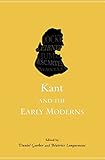Kant and the Early Moderns / Béatrice Longuenesse, Daniel Garber.
Material type: TextPublisher: Princeton, NJ : Princeton University Press, [2008]Copyright date: ©2008Edition: Course BookDescription: 1 online resourceContent type:
TextPublisher: Princeton, NJ : Princeton University Press, [2008]Copyright date: ©2008Edition: Course BookDescription: 1 online resourceContent type: - 9780691137018
- 9781400828968
- 193 22
- B2798
- online - DeGruyter
- Issued also in print.
| Item type | Current library | Call number | URL | Status | Notes | Barcode | |
|---|---|---|---|---|---|---|---|
 eBook
eBook
|
Biblioteca "Angelicum" Pont. Univ. S.Tommaso d'Aquino Nuvola online | online - DeGruyter (Browse shelf(Opens below)) | Online access | Not for loan (Accesso limitato) | Accesso per gli utenti autorizzati / Access for authorized users | (dgr)9781400828968 |
Browsing Biblioteca "Angelicum" Pont. Univ. S.Tommaso d'Aquino shelves, Shelving location: Nuvola online Close shelf browser (Hides shelf browser)

|

|

|

|

|

|

|
||
| online - DeGruyter Portable Property : Victorian Culture on the Move / | online - DeGruyter Ernst Cassirer : The Last Philosopher of Culture / | online - DeGruyter Thinking of Others : On the Talent for Metaphor / | online - DeGruyter Kant and the Early Moderns / | online - DeGruyter On the Side of the Angels : An Appreciation of Parties and Partisanship / | online - DeGruyter A Modern Legal Ethics : Adversary Advocacy in a Democratic Age / | online - DeGruyter Russian Orthodoxy Resurgent : Faith and Power in the New Russia / |
Frontmatter -- Contents -- Preface -- Abbreviations and References for Primary Sources -- Introduction / Garber, Daniel / Longuenesse, Béatrice -- Chapter 1. Kant's "I Think" versus Descartes' "I Am a Thing That Thinks" / Longuenesse, Béatrice -- Chapter 2. Descartes' "I Am a Thing That Thinks" versus Kant's "I Think" / Beyssade, Jean-Marie -- Chapter 3. Kant's Critique of the Leibnizian Philosophy: Contra the Leibnizians, but Pro Leibniz / Jauernig, Anja -- Chapter 4. What Leibniz Really Said? / Garber, Daniel -- Chapter 5. Kant's Transcendental Idealism and the Limits of Knowledge: Kant's Alternative to Locke's Physiology / Guyer, Paul -- Chapter 6. The "Sensible Object" and the "Uncertain Philosophical Cause" / Downing, Lisa -- Chapter 7. Kant's Critique of Berkeley's Concept of Objectivity / Emundts, Dina -- Chapter 8. Berkeley and Kant / Winkler, Kenneth P. -- Chapter 9 Kant's Humean Solution to Hume's Problem / Waxman, Wayne -- Chapter 10. Should Hume Have Been a Transcendental Idealist? / Garrett, Don -- Notes -- Bibliography -- Contributors -- Index
restricted access online access with authorization star
http://purl.org/coar/access_right/c_16ec
For the past 200 years, Kant has acted as a lens--sometimes a distorting lens--between historians of philosophy and early modern intellectual history. Kant's writings about Descartes, Leibniz, Locke, Berkeley, and Hume have been so influential that it has often been difficult to see these predecessors on any terms but Kant's own. In Kant and the Early Moderns, Daniel Garber and Béatrice Longuenesse bring together some of the world's leading historians of philosophy to consider Kant in relation to these earlier thinkers. These original essays are grouped in pairs. A first essay discusses Kant's direct engagement with the philosophical thought of Descartes, Leibniz, Locke, Berkeley, or Hume, while a second essay focuses more on the original ideas of these earlier philosophers, with reflections on Kant's reading from the point of view of a more direct interest in the earlier thinker in question. What emerges is a rich and complex picture of the debates that shaped the "transcendental turn" from early modern epistemology, metaphysics, and philosophy of mind to Kant's critical philosophy. The contributors, in addition to the editors, are Jean-Marie Beyssade, Lisa Downing, Dina Emundts, Don Garrett, Paul Guyer, Anja Jauernig, Wayne Waxman, and Kenneth P. Winkler.
Issued also in print.
Mode of access: Internet via World Wide Web.
In English.
Description based on online resource; title from PDF title page (publisher's Web site, viewed 08. Jul 2019)


